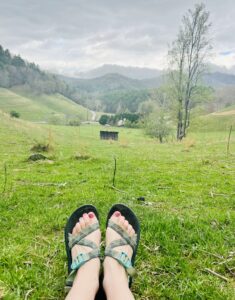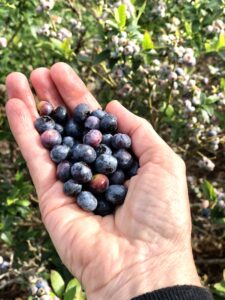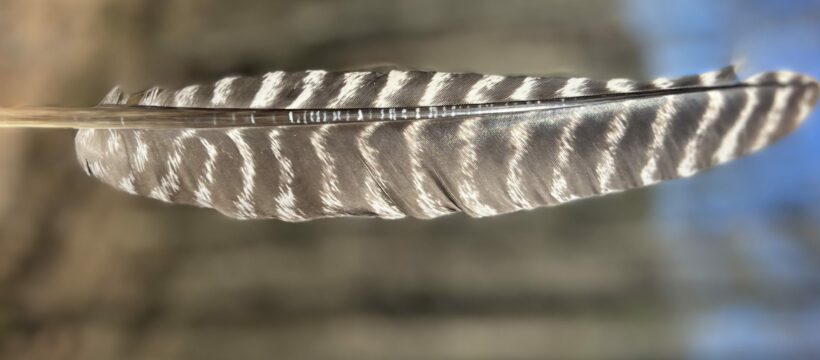***November is National Adoption Awareness Month.***
“And now these three remain: faith, hope and love.
But the greatest of these is love.”
(I Corinthians 13:13 NIV)
*******
I know Emily Dickinson penned this in a poem—
‘Hope’ is the thing with feathers…
But honestly, for me, those words once stirred the thought that hope is fleeting, that it just might–
- Fly away.
- Disappear.
Unlike this notion, the Apostle Paul lists hope as one of the greatest things that remain, along with faith and love.
What I’ve discovered, however, is both Dickinson and Paul are correct with regard to what they’ve said concerning hope.
In fact, while Hope didn’t have feathers, she did remain, at least for a season. Even more, love—especially motherly love—was the greatest thing about her.
Hope was a dog—a mutt of sorts, though she certainly had some spaniel in her DNA.
Black and white, spotted with a feathery tale, she came to live with us not long after our move to western North Carolina. Friends needed to rehome Hope. “Might you take her? She’d be the perfect addition to Selah Farm,” they said.
And she was… sort of.
You see, we already had a dog, a Blue Heeler pup named Jack. Furthermore, my in-laws next door had two dogs—Shadow, a Black Labrador and Blue Girl, who happened to be our Jack’s momma.
And Hope?
She didn’t fit in very well, at least not at first. After all, dogs can be territorial, and such was the case for them, especially for Hope and Blue Girl.
They’d spar over food. They’d fight for attention. They even fought over where they’d use the bathroom.
Like two competitive teenage girls, those dogs! We could only pray they’d eventually come around.

Things settled some when we added yet another dog to our pack—a gentle Golden Retriever puppy our sons named Annabelle. Her presence brought out nurturing tendencies in Hope, and she began to mother the newcomer—sharing the same bed, snuggling with her, and cleaning her from head to tail.
They were fast friends, which was fine. After all, Jack was closest to his next-door mother, and all were happy on the home-front.
Well, almost.
In truth, it was me who struggled. Despite my wonderful husband, our two amazing sons, and a loving, close-knit family next door, I battled sadness. I was waiting on the fulfillment of what I knew were promises from God—words I’d come to hold dear, believed were from Him.
The root of my despair was infertility—barrenness that robbed me of experiencing the joy of carrying a child in my body.
Yes, I loved our boys, and I knew God brought them to our family at just the right time, in just the right manner. Still, I longed to know the pleasure, the sensation, of life inside me—to feel the kick of growing feet, the flutter of movement that I’d only heard about from other giddy moms-to-be.
When we moved to our farm in 2002—the 50-acre property tucked in a valley, surrounded by the Smoky Mountains—we’d already suffered the loss of a daughter through a failed adoption.
Though my heart had healed considerably, I was still holding on with hope that more children would be added to our family, and I believed God had biological children for us.
Hadn’t He said so? Or so I thought.
My mom knew my love for children’s picture books, and she gave me one just prior to our move south. A lovely story, it’s by children’s author Patricia MacLachlan (illustrated by Mike Wimmer), and we enjoyed it many times while we still lived on that quiet, tree-lined street outside Indianapolis.
“Read All the Places to Love,” one son would exclaim, and we’d snuggle up to read it again, savoring its beautiful illustrations.
“Wouldn’t it be nice to live somewhere like that?” I’d ask, pointing to the picture of rolling hills, dotted with dancing daisies. “That’s a place I’d love to call home!”
So, when we found the small farmhouse nestled in the rolling hills of western North Carolina, learned it was for sale, we thought it too good to be true. It did indeed seem like we’d stepped into our favorite storybook.

It wasn’t until after our move, however, that I discovered something more—learning a truth whispered to my heart by the One who loves to give good and precious gifts to His children, no matter their age.
One day not long after our last box had been unpacked, one of the boys pulled the familiar book from the shelf.
“Read this again,” he said, handing me All the Places to Love.
Tucked in among pillows on my bed, I opened it and began to read—our boys joining me from memory in parts, sometimes aloud, sometimes just little lips moving.
Suddenly, words struck me in a new way. Though I’d read them countless times before, it was as if God had a fresh message for me.
In the story, the mother and grandmother, along with the boy, climb a hill on their property, each carrying a basket. They’re hiking to visit a favorite spot on the farm—the blueberry barrens, where blueberries grow.
And I heard His whisper–
“You can be fruitful—yes, even in barrenness.”
Not understanding what a blueberry barren was, I researched this further, learning there are places where growth is purposefully burned that a greater abundance of fruit might result.

- Death to life.
- Destruction leading to fruitfulness.
As this truth settled in my heart, I began to walk in greater joy—believing that I could be fruitful despite my barrenness. That God could and would use me, not merely in spite of but because of the literal barrenness I knew.
This revelation was a game changer.
But there was one more thing—something about that beautiful illustration of mother and son climbing the hill to the blueberry barrens, buckets in hand. And one of our boys pointed it out.
“Look, momma! That dog—it’s Hope!”
And it was true.
The faithful dog by their side in the illustrator’s artwork was the exact image of our loving pet—the mutt who’d also found a home on Selah Farm. The one who, at first, struggled to find her place but, after adopting Annabelle, enjoyed the beauty of being a mother.
Indeed. And though Hope had fur rather than feathers, her presence—her faithfulness and love—remained, at least for a season. God used this dog to affirm that, though we don’t always understand his ways, we can trust His heart.
And you know what?
I agree with Emily Dickinson—
‘Hope’ is the thing with feathers…
It helps us soar to all the places—to all the people—God gives us to love.
Yes, even to and through blueberry barrens.
*******
Kind Father, thank you for knowing best—for all those promises in Your Word which enable us to walk, no matter how dark, how barren, the season, with joy and peace. Our hope is in You, Jesus, and we can journey knowing You will take us to beautiful places where we might not only experience blessing but be a blessing in others’ lives as well. Amen!
Think About:
What barren seasons have you walked through? What promise(s) from the Bible helped you navigate, even if the way seemed dark?
Think about Paul’s words concerning faith, hope, and love. Do you know a person / people who exude these qualities, despite experiencing personal hardship?
Has God ever spoken to you in an unusual manner, perhaps through a book, a song, or even a pet? Take time to journal this, placing the story as a stone of remembrance on the altar of gratitude. Thank Him again, because He loves to hear our praise!




Maureen, This was such a beautiful article. Your heart shone through each word. I had never heard of the blueberry barrens. So powerful. I’m sharing with friends.
Thank you so much for your kind words and for sharing. We all need messages of hope during these trying times. I love when God takes something painful and turns it into something with purpose. Blessings.
Maureen, thank you for sharing from the heart. Blessings.
Thank you so much for taking the time to read and for your kind words and encouragement. Blessings.
I love that God prompted your son to re-read that book. He is so good to reach out to us in our barren seasons. I can testify of His goodness to me in my times.
Oh, we read it many times, but I’ll never forget that one particular time–when it clicked that Hope was the dog in the illustration! And when God whispered about blessings in barrenness from the author’s words about the blueberry barrens. So so special! God is good! Thank you, dear friend!
I love your reminder that we can be fruitful even in barrenness. As an unmarried woman with no children, I sometime struggle with this concept. But He is the One who defines fruitfulness.